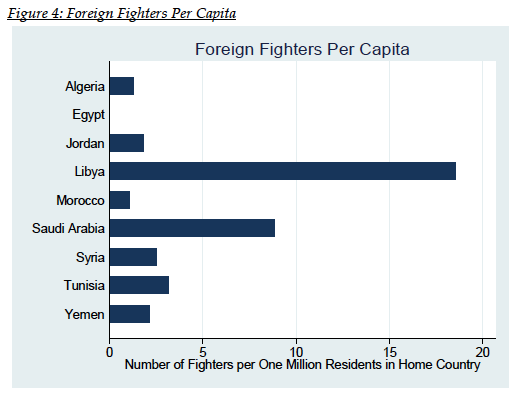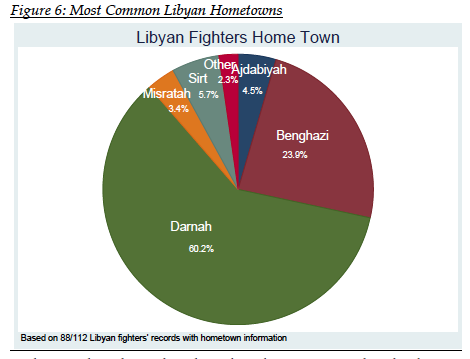Iraq was at its most violent in 2006 and 2007, just as the U.S. “surge” of 30,000 additional troops into the country was getting underway. A West Point analysis of the foreign fighters involved in the increasing carnage showed that the nation sending the most militants to Iraq from August 2006 to August 2007, was, on a per-capita basis, Libya.
Drilling down into the data, the December 2007 examination from the U.S. Military Academy’s Combating Terrorism Center showed that nearly all of the Libyan fighters came from the northeastern part of the country, which is where the rebels we are now helping hail from. It’s a small sample, but something to keep in mind.
An April 2008 cable from the U.S. Embassy in Tripoli to Washington reported that the government of Libya (GOL) had spurned U.S. offers of “soft power” cooperation to improve living conditions for those in eastern Libya. Washington hoped such efforts might dampen the residents’ fervor to head to Iraq to kill Americans. Such actions, a senior Libyan diplomat told his U.S. counterpart, would be counter-productive because it would raise fears of foreign meddling, and remind Libyans of their colonial past under the harsh thumbs of Italy and the Ottoman Empire.
The U.S. diplomat suggested Washington could help by funding development efforts, “possibly to be implemented by quasi-governmental NGO’s such as the Qadhafi” — as in Muammar — “Development Foundation.” No thanks, the Libyan diplomat responded.
“The best course for the U.S. would be to publicly `ignore’ extremism in eastern Libya…claiming it would `go away,’” the Libyan told the American diplomat. “The GOL’s strategy appears to combine reliance on traditional efforts by security organizations to monitor and disrupt extremists’ activities while engaging in significant development programs to improve socio-economic conditions enough to blunt the appeal of the extremist message.”
The U.S. diplomat thought otherwise. “The policy of deliberately impoverishing the east to ensure political quiescence has not worked,” concluded the cable, recently released by Wikileaks. “While senior regime figures appear to have recognized that the east merits more attention and investment, the reported ability of radical imams to propagate messages urging support for and participation in jihad despite security organizations’ efforts, suggests that claims by senior GOL officials that the east is under control may be overstated.”




